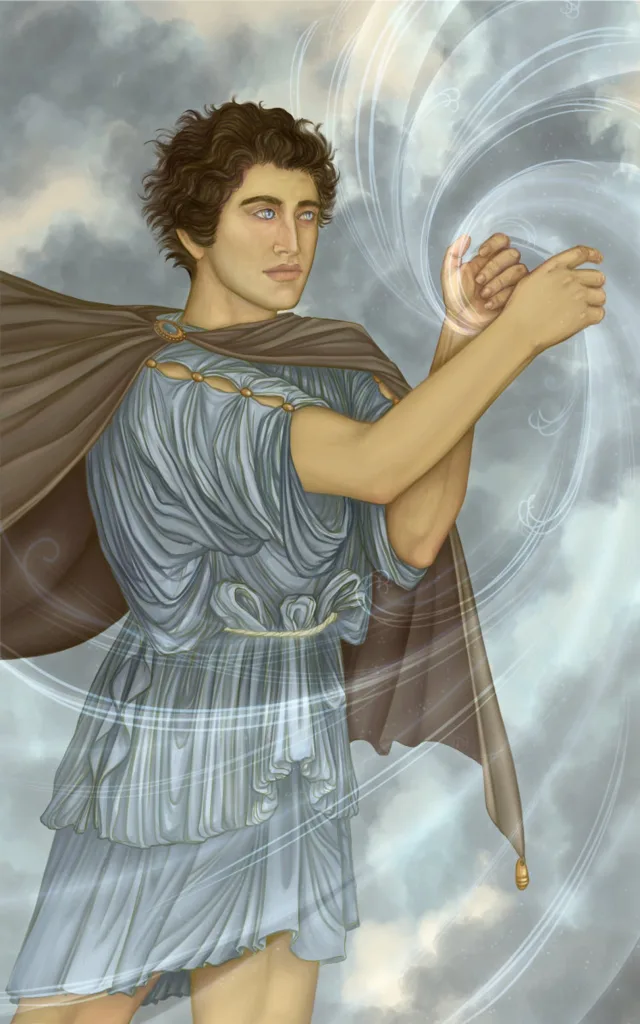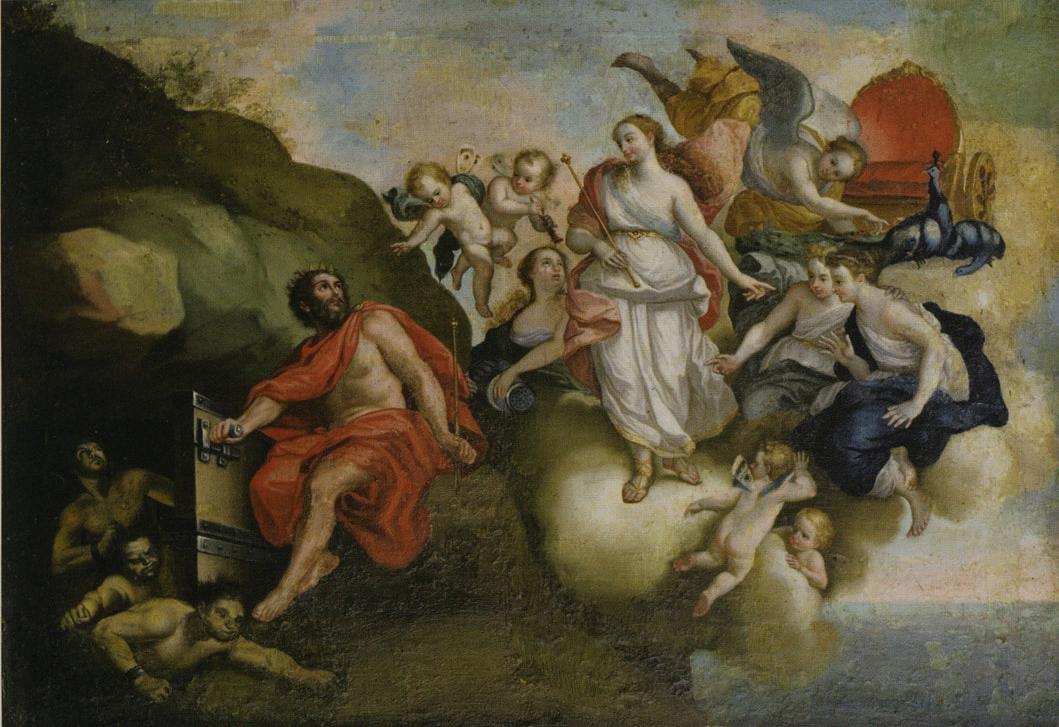Today we’re taking a look at Aeolus, the god of winds from Homer’s epic poem, The Odyssey. He is oftn remembered for the role he plays in helping Odysseus on his journey home to Ithaca.
Aeolus was a minor god in Greek mythology, but he held a special place on Mount Olympus. He was known as the keeper of the winds and king of the mythical floating island of Aiolia (Aeolia). His island was favoured by Zeus himself and he had authority unheard of among mortal peers.
In The Odyssey, Aeolus presents Odysseus with a bag containing all of the winds. In addition to this, he also stirs up a westerly wind to guide Odysseus and his crew home. Unfortunately, some of Odysseus’ crew members open the bag and case the winds to escape which drives them back to Aeolus’ island.
Throughout The Odyssey, Aeolus acts as an ally to Odysseus and helps him on his journey. He provides Odysseus with advice and helps him get closer to reaching his goal – returning home safely after battling monsters and gods alike during his 10-year voyage around the Mediterranean Sea.

Aeolus is often seen as a symbol of good fortune in Homer’s epic poem because he uses his power over the winds to help Odysseus reach Ithaca in one piece. He also serves as an example for mortals who strive for greatness despite their limitations – no matter how powerful we are, there are still forces beyond our control that can affect our lives and our journeys!
The Notable Achievements of Aeolus
Aeolus, also known as Aiolos, is best known for being the divine keeper of the winds and king of the mythical floating island of Aiolia (Aeolia). He was believed to have the power to control and manipulate the winds, using them in varous ways. Aeolus was said to be able to conjure up or tame fierce storms at will, or send beneficial breezes across the sea. He kept the destructive Storm-Winds locked away inside his isle and only released them upon command of great gods such as Zeus. As a result, he is often depicted as a wise and powerful figure in Greek mythology.
Aeolus’ Assistance to Odysseus
Aeolus, the minor god, provided great assistance to Odysseus during his journey home from the Trojan War. Aeolus gave Odysseus a favourably strong wind that propelled him and his crew in the right direction. He also presented Odysseus with a bag contaiing all of the unfavourable winds which would have blown them off course. Unfortunately, Odysseus’ companions opened the bag and released the unfavourable winds which sent them back to Aeolus’ island. Despite this setback, Aeolus had still provided Odysseus and his crew with an invaluable aid to their journey home.
Description of Aeolus in The Odyssey
In the Odyssey, Aeolus is described as a powerful and respected figure. He is known as the god of winds, havig been entrusted by Zeus himself to guard the winds. His home is a floating island, which is seen as a great honor by all other gods. He holds authority over mortal men and has been given the task of controlling the winds and gifting them to those who are favored by Zeus. He is often depicted with a staff in hand, symbolizing his power over the wind. In addition to this, he has knowledge of storms and tempests, making him even more feared and respected by mortals.
Aeolus’ Aid to Odysseus
Aeolus helped Odysseus in Book 10 of Homer’s epic poem, The Odyssey. When Odysseus and his crew arrived at Aeolus’ kingdom, the king was so impressed with Odysseus that he presented him with a bag containing all of the winds. With this gift, Aeolus stirred up a westerly wind to guide Odysseus and his crew home. Unfortunately, the crew opened the bag out of curiosity, causing all of the winds to be released and blowing them off course. Despite this mishap, Aeolus still showed kindness to Odysseus and provided him with a safe journey home.
The Purpose of Aeolus Giving Odysseus Wind
Aeolus gave Odysseus wind in order to ensure his safe passage home. Knowing of Odysseus’ journey and the difficult seas he would have to traverse, Aeolus wanted to give him every advantage possible. By gifting him with the winds, Aeolus was able to provide a powerful tool that would allow Odysseus to control the direction and speed of his voyage. Through this gift, Aeolus was able to provide a greater chance of success for Odysseus’ dangerous journey back home.

Source: greeklegendsandmyths.com
The Rejection of Odysseus by Aeolus
Aeolus throws Odysseus out because he believes that the gods are punishing him for some unknown transgression. Aeolus believes that if he were to keep Odysseus, the gods might bring harm to him and his people. He is also aware that his power is limited in comparison to the divine will of the gods. Therefore, he decides to cast Odysseus away in order to protect himslf and his people from potential harm. By doing so, he also sends a message that he respects and obeys the will of the gods above all else.
The Death of Aeolus
Aeolus was killed by Lycus in a tragic turn of events while seeking justice for his daughter Antiope. According to the myth, Antiope had been impregnated by Lycus, and he had sought to conceal his actions. Aeolus, upon learning this, sought to right the wrongs done to his daughter and was killed by Lycus in the process. His son Jason was away on the Argonautic Expedition at the time of his death.
The Power of Aeolus
The power of Aeolus, also known as the Master of the Winds, is aerokinesis – the ability to manipulate and control wind. This power is incredibly versatile, allowing Aeolus to create powerful gusts of wind, direct existing winds, and even create cyclones. He can use this power to create strong barriers of air for defense or offense, or even fly hmself and others through the air. In addition, he has divine authority over all winds; this means he can bend them to his will or even summon them from far away places. Finally, Aeolus is able to create storms with ease – whether it’s a gentle breeze or a raging tornado.
Aeolus’ Gift to Odysseus Upon Departure
When Odysseus and his crew departed Aeolus’ home, they were given a special gift from the god of winds. This gift was the four winds which had been sealed into an ox-hide bag by Aeolus himself. He gave them to Odysseus, entrusting him with the task of commanding the winds so that they would bring his ship safely home. With these four powerful winds in their possession, it seemd as though their journey might be blessed with favourable conditions for the remainder of their voyage.
The Mysterious Death of Aeolus
Parthenopaeus killed Aeolus in the war of the Seven against Thebes. Parthenopaeus was a son of the goddess Atalanta and was one of the seven champions sent by the Argives to fight against Thebes. He fought bravely, and eventually killed Aeolus with an arrow while he was defending Thebes. This victory sealed the Argive’s victory in the war and ultimately led to thir siege of Thebes.
The Origin of Aeolus’ Powers
Aeolus, according to Greek mythology, was granted his power of controlling the winds by the supreme god, Zeus (also known as Kronion). At Zeus’ command, Aeolus was made the ‘warden’ of the winds and was given authority to raise or lower them or shift them in whatever direction he saw fit. He was also given a special cavern on an island where he coud contain the most powerful storm winds and only release them at Zeus’ command. This made Aeolus one of the most powerful mortals in the ancient world, and granted him a unique ability to manipulate the winds like no other.
Marrying of Aeolus
Aeolus was married to Enarete, the daughter of Deimachus. Together, they had sven sons and five daughters – Cretheus, Sisyphus, Athamas, Salmoneus, Deion, Magnes, and Perieres for sons and Canace, Alcyone, Pisidice, Calyce, and Perimede for daughters.
The Appointment of Aeolus as God of the Winds
Zeus, the supreme god of Mount Olympus, gave Aeolus the job of controlling and commanding the winds. This was part of a divine plan to help Odysseus and his men on their long journey home from Troy. Zeus entrusted Aeolus with this unique power, granting him authority over all the winds in order to ensure Odysseus’ safe passage.

Source: boijmans.nl
Conclusion
Aeolus was an incredibly powerful figure in the Odyssey, as he was entrusted by Zeus to be the keeper of the winds. His floating island of Aeolia was favored by the god of gods himself, and his authority exceeded even that of his mortal peers. He presented Odysseus with a bag containing all of the winds, and stirred up a westerly wind to guide Odysseus and his crew home. It is clear from this encounter that Aeolus held a unique place in Greek mythology and had an important role to play in the epic tale of Odysseus’ journey home.
